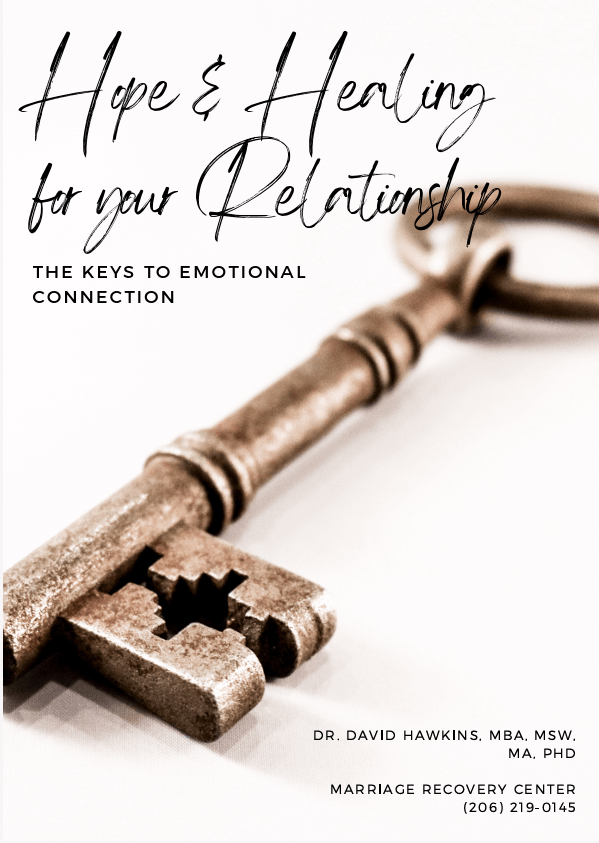Dr. David Hawkins explains what is emotional abuse. The problem of narcissistic and emotional abuse in our society has grown to epic proportions and there are so many people affected, including friends and family members, co-workers, anyone in a position of leadership and power, etc.
To address the growing need and demand for information, training and resources, the Marriage Recovery Center now has a sister organization, the Emotional Abuse Institute, whose mission is to bring emotional abuse out of the shadows and end what he calls “the silent epidemic” through education, empowerment, training and resources for anyone seeking to understand, confront, and end narcissistic and emotional abuse.
What is Emotional Abuse?
Emotional abuse is a pervasive issue that affects individuals in various relationships, including marriages, friendships, workplaces, and even within families. Despite its prevalence, it often goes unnoticed and unaddressed, leading to its classification as a silent epidemic. In this article, we will explore the basics of emotional abuse, its characteristics, the power dynamics involved, and the steps individuals can take to recognize, confront, and set boundaries against this form of abuse.
Understanding Emotional Abuse
Emotional abuse is characterized by the use of power and control to manipulate and overpower another individual. It encompasses both overt and covert behaviors aimed at obtaining personal benefits while causing harm to the victim. Examples include intimidation, name-calling, physical violence, withdrawal, sulking, shaming, and dismissing the other person’s thoughts and feelings.
The Insidious Nature of Emotional Abuse
Emotional abuse becomes particularly insidious when it occurs repeatedly over an extended period. The consistent use of abusive tactics, such as sulking, blaming, or threatening, creates an oppressive environment for the victim. As the abuser gains power and control, the victim often feels diminished, less powerful, and trapped in a non-equal relationship. It can occur in various settings, including workplaces, marriages, friendships, and between adult parents and children.
The Silent Epidemic
Emotional abuse is often referred to as a silent epidemic due to its hidden nature. While overt abuse may be visible to others, covert abuse takes place behind closed doors, making it difficult for outsiders to recognize. The concept of Dr. Jekyll and Mr. Hyde aptly describes the two faces of an abuser – the kind and respected persona displayed publicly and the abusive behavior exhibited in private. Unfortunately, it is not widely discussed or understood, even among professionals who offer counseling and support.
Victims’ Struggle to Speak Out
Victims often face barriers to seeking help and speaking out about their experiences. The abuser may deny the existence of abuse, gaslighting the victim into believing it is all in their head. Consequently, victims may question themselves and feel ashamed to discuss the abuse. They may have attempted multiple strategies to end the abuse but found them unsuccessful. Over time, victims adapt, cope, and accommodate the abuse, further diminishing their own sense of self-worth and reinforcing the abuser’s power.
The Power Differential
Emotional abuse thrives on the power differential between the abuser and the victim. In a healthy relationship, thoughts and feelings are valued and respected. However, in an emotionally abusive dynamic, the victim’s thoughts and feelings are disregarded. The imbalance of power creates an unequal relationship where the victim’s concerns are dismissed, further perpetuating the cycle of abuse.
Strategies to Address Emotional Abuse
If you find yourself in an emotionally abusive relationship, whether it’s at work, home, or elsewhere, there are steps you can take to address the abuse:
a. Recognize Abusive Behavior: Educate yourself about emotional abuse to recognize the signs and patterns. By understanding the dynamics of abuse, you can begin to identify and validate your experience.
b. Confront the Abuse: While confronting the abuser may not always yield the desired outcome, it is essential to assertively communicate that their behavior is unacceptable. Express your disapproval and let them know how their actions affect you.
c. Set Boundaries: Establishing boundaries is crucial in protecting yourself from further abuse. Clearly communicate your limits and expectations. Although some individuals may disregard your boundaries, it is important to assert your needs and enforce consequences if they are crossed.
Seek Help and Self-Validation
Emotional abuse takes a toll on mental and emotional well-being, often leaving victims feeling exhausted and overwhelmed. It is crucial to seek support from trusted individuals, such as friends, family, or professionals, who can provide guidance and assistance. Additionally, practicing self-validation by acknowledging the abuse, confronting it, and asserting your worth sends a powerful message to both the abuser and yourself.
Conclusion
Emotional abuse is a pervasive issue that thrives in the shadows of relationships. By understanding its characteristics, power dynamics, and the steps to address it, individuals can break free from the cycle of abuse. Recognizing, confronting, and setting boundaries against emotional abuse are crucial for reclaiming one’s power and well-being. Seek help, validate your experiences, and remember that you deserve to be treated with respect and dignity in all your relationships.
To learn how we can help, reach out to us at (206) 219-0145 or info@marriagerecoverycenter.com to speak with a Client Care Specialist
Also read: Narcissistic Personality Disorder vs Narcissistic Personality Traits
About Dr. Hawkins:
The internet is inundated with hyperbole and misinformation about narcissism, leaving many people confused and hopeless. Get the facts on narcissism and emotional abuse from someone who has been researching, writing about and treating narcissism and emotional abuse for over a decade.
Dr. Hawkins is a best-selling author and clinical psychologist with over three decades of experience helping people break unhealthy patterns and build healthier relationships.
He is the founder and director of the Marriage Recovery Center and the Emotional Abuse Institute which offers education, training and counseling for people who want to break free of, and heal from, emotional abuse. Whether the perpetrator of the abuse is your spouse, partner, parent, boss, friend or family member, we offer practical advice for anyone trapped in a toxic, destructive relationship.
In addition to narcissism & emotional abuse, you’ll learn about the lesser known forms of abuse, including covert abuse, reactive abuse, spiritual abuse, secondary abuse, relationship trauma and much more.








